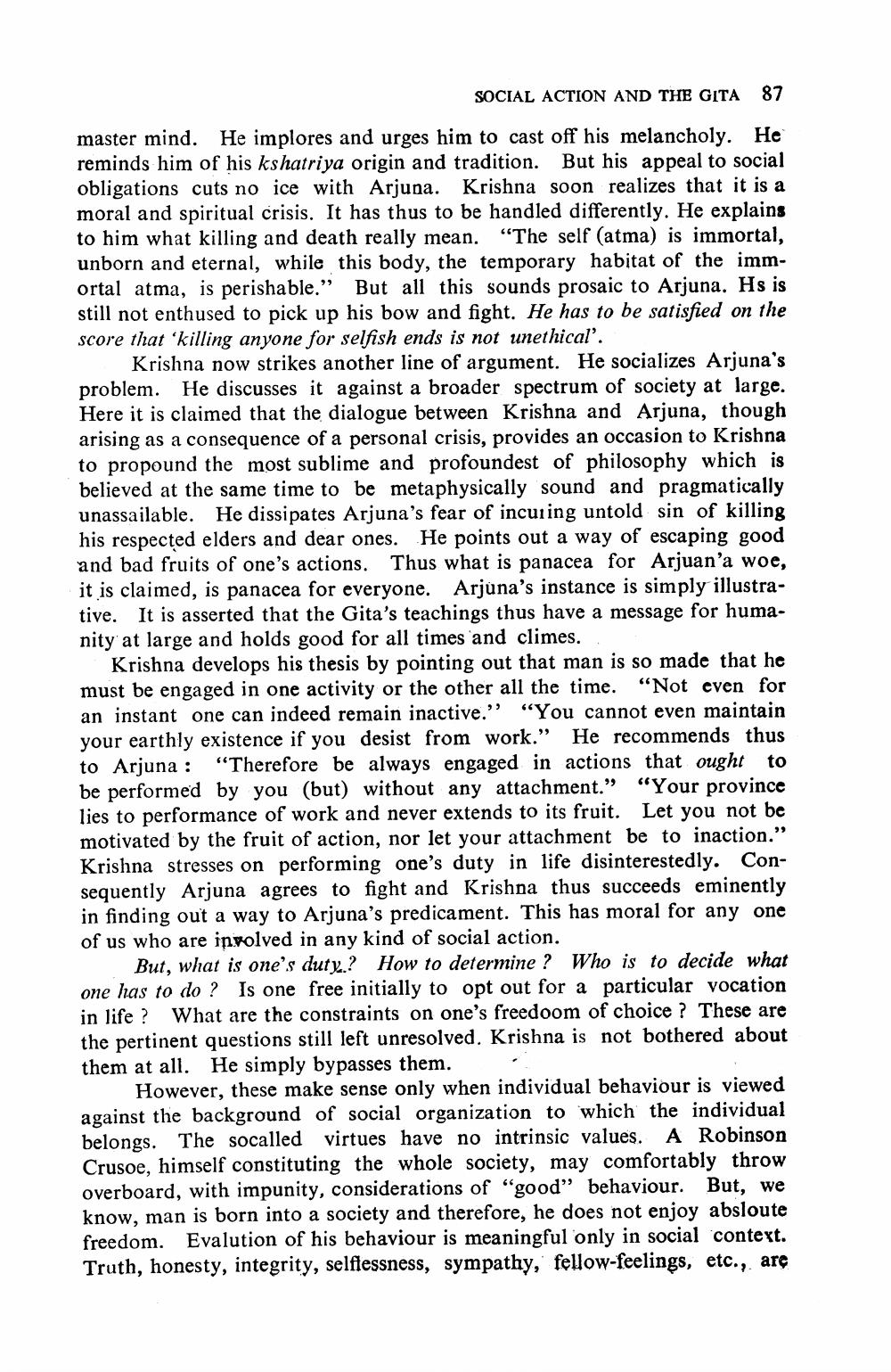Book Title: Social Action And The Gita Author(s): Jagdeva Singh Publisher: Jagdeva Singh View full book textPage 2
________________ SOCIAL ACTION AND THE GITA 87 master mind. He implores and urges him to cast off his melancholy. He reminds him of his kshatriya origin and tradition. But his appeal to social obligations cuts no ice with Arjuna. Krishna soon realizes that it is a moral and spiritual crisis. It has thus to be handled differently. He explains to him what killing and death really mean. "The self (atma) is immortal, unborn and eternal, while this body, the temporary habitat of the immortal atma, is perishable." But all this sounds prosaic to Arjuna. Hs is still not enthused to pick up his bow and fight. He has to be satisfied on the score that 'killing anyone for selfish ends is not unethical'. Krishna now strikes another line of argument. He socializes Arjuna's problem. He discusses it against a broader spectrum of society at large. Here it is claimed that the dialogue between Krishna and Arjuna, though arising as a consequence of a personal crisis, provides an occasion to Krishna to propound the most sublime and profoundest of philosophy which is believed at the same time to be metaphysically sound and pragmatically unassailable. He dissipates Arjuna's fear of incuring untold sin of killing his respected elders and dear ones. He points out a way of escaping good and bad fruits of one's actions. Thus what is panacea for Arjuan'a woe, it is claimed, is panacea for everyone. Arjuna's instance is simply illustrative. It is asserted that the Gita's teachings thus have a message for humanity at large and holds good for all times and climes. Krishna develops his thesis by pointing out that man is so made that he must be engaged in one activity or the other all the time. "Not even for an instant one can indeed remain inactive." "You cannot even maintain your earthly existence if you desist from work." He recommends thus to Arjuna : "Therefore be always engaged in actions that ought to be performed by you (but) without any attachment." "Your province lies to performance of work and never extends to its fruit. Let you not be motivated by the fruit of action, nor let your attachment be to inaction." Krishna stresses on performing one's duty in life disinterestedly. Consequently Arjuna agrees to fight and Krishna thus succeeds eminently in finding out a way to Arjuna's predicament. This has moral for any one of us who are involved in any kind of social action. But, what is one's duty.? How to determine? Who is to decide what one has to do? Is one free initially to opt out for a particular vocation in life? What are the constraints on one's freedoom of choice? These are the pertinent questions still left unresolved. Krishna is not bothered about them at all. He simply bypasses them. However, these make sense only when individual behaviour is viewed against the background of social organization to which the individual belongs. The socalled virtues have no intrinsic values. A Robinson Crusoe, himself constituting the whole society, may comfortably throw overboard, with impunity, considerations of "good" behaviour. But, we know, man is born into a society and therefore, he does not enjoy absloute freedom. Evalution of his behaviour is meaningful only in social context. Truth, honesty, integrity, selflessness, sympathy, fellow-feelings, etc., arePage Navigation
1 2 3 4 5
